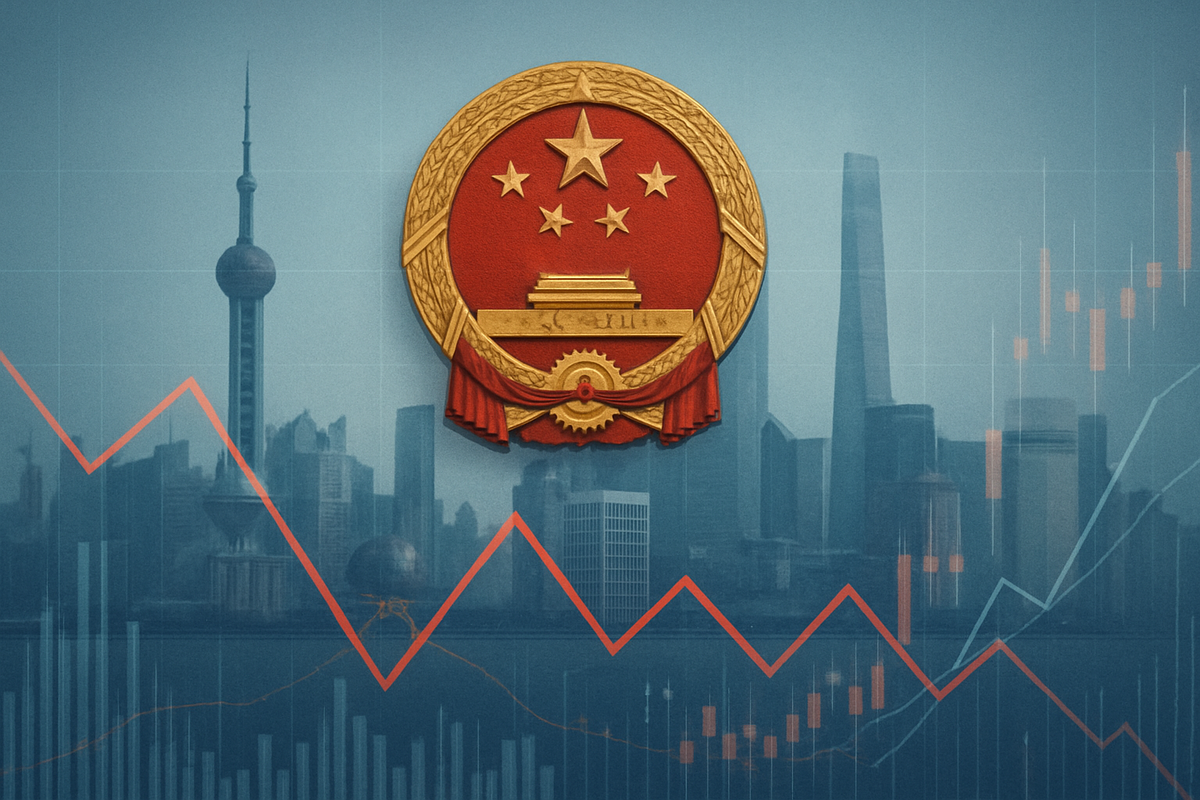
Reports are circulating on November 13, 2025, that Wu Qing, the chairman of the China Securities Regulatory Commission (CSRC), has reportedly sought approval to step down from his pivotal role, citing health concerns. This significant development, if confirmed, could herald a period of uncertainty and potential policy shifts within China's financial markets. As the news unfolds, investors and market participants are closely watching for official confirmation and clues regarding the future direction of regulatory oversight in the world's second-largest economy.
Wu Qing, often dubbed the "broker butcher" for his stringent enforcement and crackdown on market malpractices, assumed leadership of the CSRC on February 7, 2024. His tenure has been marked by a notable rebound in the Shanghai Composite Index (SSE: 000001), which reportedly surged by approximately 45% under his watch. The potential departure of such a key figure, known for his firm hand in stabilizing markets and restoring investor confidence, raises immediate questions about the continuity of current policies and the broader implications for market stability and investor sentiment.
A Regulator's Tenure Under Scrutiny: Details, Timeline, and Market Jitters
Sources familiar with the matter indicate that Wu Qing has informed relevant authorities of his intent to step down due to health concerns. However, as of November 13, 2025, it remains unconfirmed whether his resignation has been officially accepted or when he would formally leave office. In a notable turn of events, hours after these reports emerged, the CSRC issued a statement and published photographs of Wu Qing participating in meetings in France and Brazil between November 10 and 13. This swift public display of his activities is widely interpreted by analysts as an effort by authorities to quash rumors and prevent market instability, highlighting the immediate concern within Beijing regarding market destabilization.
Wu Qing's appointment in February 2024 came at a critical juncture, succeeding Yi Huiman, who was abruptly removed amidst market turmoil and subsequently came under investigation for "serious violations of discipline and law" in September 2024. Prior to leading the CSRC, Wu Qing, a holder of a doctorate in finance, had a long and distinguished career in financial regulation. He previously headed the Shanghai Stock Exchange (SSE: 000001) from 2016 to 2017 and earned his "broker butcher" nickname during his earlier stint at the CSRC's Risk Disposal Office in 2005 for his aggressive crackdowns on non-compliant securities firms. His elevation to the elite Central Committee of the ruling Communist Party in October 2022 underscored his political standing.
Under Wu Qing's leadership, the CSRC implemented a series of policies aimed at stabilizing and reforming China's capital markets. These included a "zero tolerance" approach to illegal trading activities, enhancing the dividend distribution system for listed companies, and introducing "ST" warnings for those with insufficient payout policies. He also focused on promoting long-term investment, deepening reforms in the Growth Enterprise Market (GEM), and facilitating international investment by simplifying rules for the Qualified Foreign Institutional Investor (QFII) program and restarting the pipeline for secondary listings on the Hong Kong Stock Exchange (HKEX: 0388). These measures contributed to the significant market rebound observed during his tenure.
Initial market reactions to the unconfirmed news have been characterized by heightened uncertainty. Experts and fund managers have expressed concerns that Wu Qing's departure could unsettle markets, potentially damaging investor confidence and hurting market expectations, especially given his role as the "architect of recent capital market reforms." There are worries that his exit could slow the pace of regulatory modernization and complicate Beijing's efforts to attract foreign investment and strengthen global confidence in China's capital market. Investors are now closely watching for signals regarding his potential successor, particularly whether a "dovish replacement" will be appointed.
Navigating the Shifting Sands: Potential Winners and Losers
The potential resignation of Wu Qing and any subsequent shift in leadership at the CSRC could have a discernible impact on various public companies and sectors within China's financial landscape. Wu Qing's stringent regulatory approach, characterized by strict listing and delisting rules, a crackdown on speculation, and an emphasis on corporate governance and shareholder returns, has shaped the operational environment for many firms. The immediate aftermath of such a high-profile, unconfirmed resignation could lead to increased market volatility and a potential dip in investor sentiment across the board.
Potential "Losers" (or those that might experience less pressure if policies soften):
- Brokerage Firms and Securities Companies with Weak Compliance: While Wu Qing's "broker butcher" reputation meant increased scrutiny, his policies also aimed to strengthen the overall industry by weeding out bad actors. If a successor were to significantly relax compliance requirements, firms that previously struggled with his stringent oversight could temporarily find it easier. However, overall market instability could hurt all financial intermediaries.
- Companies with Poor Corporate Governance or Low Shareholder Returns: Wu Qing's emphasis on improved governance, higher dividends, and share buybacks put pressure on companies that historically underperformed in these areas. Should a successor prove less stringent on these requirements, companies that resisted such changes might face less pressure, potentially at the expense of broader investor confidence.
- Companies Engaged in Speculative or High-Frequency Trading: Wu Qing actively sought to curtail speculative activities and high-frequency trading. A departure from this stance could see an increase in such activities, potentially benefiting entities focused on short-term gains, but possibly leading to increased market volatility.
Potential "Winners" (or those that could continue to benefit from a reform agenda):
- Leading Blue-Chip Companies with Strong Fundamentals: Wu Qing's drive to ensure only robust and well-managed entities prevail in the market and to attract long-term capital directly benefited high-quality companies. A continuation of this policy direction by a reform-minded successor would likely continue to favor well-governed, fundamentally strong companies, potentially attracting more stable institutional investment.
- Innovative Technology and Strategic Industry Start-ups (especially on the STAR Market): Wu Qing facilitated funding for pre-revenue start-ups in key sectors aligning with China's "new productive forces" initiative. If the new leadership maintains this strategic focus on technological innovation, high-quality tech companies in areas like Artificial Intelligence, advanced manufacturing, and commercial aerospace could continue to receive policy support for fundraising and development, provided they meet rigorous listing criteria.
- Companies Seeking International Capital: Wu Qing's initiatives to open capital markets, such as simplifying QFII rules and restarting Hong Kong Stock Exchange (HKEX: 0388) listing pipelines, aimed to attract foreign investment. A successor committed to further capital market internationalization could create more avenues for Chinese companies to tap into global capital markets and attract foreign funds. This would benefit companies with international expansion plans or those seeking dual listings.
Wider Significance: Beyond the Immediate Headlines
The reported resignation of Wu Qing, even amidst official attempts to quell rumors, underscores broader industry trends and carries significant implications for China's financial sector. His tenure, marked by efforts to stabilize markets following a substantial decline, aligns with a larger pattern of heightened scrutiny and frequent leadership changes within China's financial regulatory bodies, often linked to market performance and ongoing anti-corruption campaigns.
The wider Chinese financial sector is navigating several overarching trends. Beijing's top priorities include risk mitigation and maintaining stability, particularly concerning the real estate sector and local government debt. Concurrently, China aims to deepen financial system reforms, optimize resource allocation, and achieve President Xi Jinping's vision of becoming a "financial superpower" that effectively supports the real economy. This ambition is intertwined with enhanced Communist Party control, reflected in institutional changes to strengthen regulatory coordination and a focus on "common prosperity," which has led to stricter oversight of financial elites, including salary caps for executives in state-backed financial institutions.
The ripple effects of Wu Qing's potential departure could extend beyond immediate market reactions. Investor sentiment, both domestic and international, could be negatively impacted, especially given his reputation as a decisive, reform-minded leader. An abrupt exit could create market instability, potentially undoing some of the confidence built during his tenure—a risk highlighted by the CSRC's swift public display of his activities. Moreover, a new chairman could signal changes in the intensity or focus of regulatory enforcement, influencing the business strategies and risk management frameworks of financial firms, including brokerages like CITIC Securities (SHA: 600030, HKEX: 6030) and foreign financial institutions operating in China.
Beyond immediate market jitters, broader policy implications loom. Wu Qing was a key figure in implementing reforms aimed at establishing a stringent system for listing and delisting companies and bolstering long-term investments. His departure could raise questions about the continuity and pace of these capital market reforms. This also intersects with China's persistent anti-corruption drive in the financial sector, where numerous high-level officials have been investigated or disciplined. Even a resignation attributed to health could be viewed within this broader context, signaling ongoing pressure on financial institutions. Furthermore, any uncertainty at the helm of a key regulator could impact foreign firms' confidence and their willingness to expand operations in China, potentially hindering Beijing's efforts to attract more international investment.
What Comes Next: Scenarios and Strategic Adaptations
The reported resignation of Wu Qing introduces a period of transition and uncertainty, prompting a critical look at what lies ahead for China's financial markets. In the short term, increased market volatility and a potential dip in investor confidence are likely as the market awaits clarity on his status and potential succession. Given the significant market gains during his tenure, some profit-taking or a temporary downturn could occur as investors reassess the regulatory landscape. The CSRC will undoubtedly prioritize stability, likely issuing further statements or taking measures to reassure investors, as demonstrated by the public display of Wu Qing's recent activities.
In the long term, the market's trajectory will heavily depend on the characteristics and policy direction of Wu Qing's eventual successor. It is plausible that Beijing will appoint a leader who continues the reform agenda, focusing on marketization, rule of law, and internationalization, including improvements to the qualified foreign investor system and expansion of cross-border interconnection mechanisms. Enhanced supervision and investor protection, driven by the ongoing anti-corruption campaign, are also expected to persist. However, a new leader might place different emphasis on specific aspects, potentially aligning more closely with the strategic priorities of China's 15th Five-Year Plan (2026-2030), which will focus on innovation, industrial upgrading, and sustainable growth.
Companies and investors operating in China's financial sector will need to be agile and adaptable. Companies should prioritize strengthening governance and compliance, focusing on sustainable growth and shareholder returns through dividends and share buybacks. Adapting to policy directives, particularly those supporting strategically important sectors like advanced manufacturing, green technology, and artificial intelligence, will be crucial. For investors, active management strategies may prove more effective in navigating potential volatility, while maintaining a long-term perspective focused on structural trends and high-quality companies is advisable. Diversification and a thorough assessment of geopolitical and regulatory risks will remain paramount.
Emerging market opportunities could arise from China's continued commitment to financial opening-up, potentially creating new avenues for foreign financial institutions in wealth management, insurance, and investment banking. The emphasis on "new productive forces" and strategic self-reliance also presents significant investment opportunities in sectors like AI, robotics, fintech, and renewable energy. However, challenges persist, including regulatory uncertainty, ongoing geopolitical tensions, lingering property market risks, and the potential for the anti-corruption drive to slow down decision-making and investment. Potential scenarios range from continuity with enhanced reform under a new leader to increased regulatory conservatism, or a heightened focus on specific strategic sectors.
Comprehensive Wrap-up: Navigating the Path Forward
The reported resignation of Wu Qing, China's securities regulatory chief, marks a pivotal moment, even as official confirmation remains pending. His tenure, characterized by a stringent yet reform-minded approach, played a significant role in stabilizing China's stock markets and fostering a period of substantial growth for the Shanghai Composite Index (SSE: 000001). The mere speculation of his departure highlights the outsized influence of key leadership figures in China's financial landscape and Beijing's immediate concern for market stability, as evidenced by the CSRC's swift actions to counter the rumors.
Moving forward, the market faces a period of potential flux. The immediate risk of increased volatility and a dip in investor confidence is palpable. However, the overarching direction of China's capital market reforms—towards stability, integrity, and investor protection—is expected to persist, regardless of who assumes the helm. The key will be the profile and policy leanings of Wu Qing's eventual successor. Will Beijing appoint another "broker butcher" to maintain strict enforcement, or will a more "dovish" leader be chosen to prioritize market liberalization? This decision will significantly influence the pace and nature of China's "slow bull" market.
The lasting impact of this event will be shaped by the transparency of Beijing's communication, the characteristics of any new appointee, and the consistency of future regulatory policies. This situation serves as a potent reminder for MarketMinute investors about how closely policy and personnel decisions from the top can affect market dynamics in China.
What Investors Should Watch For in Coming Months:
- Successor's Profile and Policies: The most critical factor will be the official announcement of a new CSRC chairman. Investors should thoroughly analyze the individual's background, past statements, and perceived alignment with market-oriented reforms.
- Continuity of Reforms: Monitor whether the CSRC maintains or expands upon reforms initiated under Wu Qing, particularly those concerning market access for foreign investors, investor protection, and improved corporate governance. Any signs of a reversal or slowdown in these areas could trigger negative sentiment.
- Macroeconomic Stability and Corporate Earnings: Beyond regulatory shifts, the broader health of the Chinese economy is vital. Look for concrete evidence of easing deflationary pressures, stabilization in the property sector, and a tangible rebound in corporate earnings, as these are fundamental drivers for sustained market outperformance.
- Effectiveness of Stimulus Measures: While Beijing has pledged various stimulus initiatives, investors should focus on the actual implementation and their efficacy in boosting economic activity. A lack of concrete follow-through has previously hindered market revival.
- Geopolitical Developments: The ongoing US-China relationship and broader global geopolitical tensions will continue to be a significant overlay, influencing investor confidence in Chinese assets.
This content is intended for informational purposes only and is not financial advice







